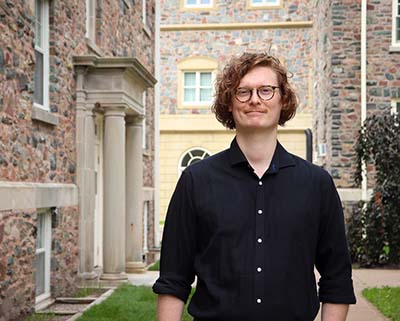“I’m not going to change computer science,” Aaron Wright says, “but my students may.”
Wright thinks for a split second then adds, “No, they will change computer science. I hope to influence that change …. I tell my computer science students, slightly tongue in cheek, that I hope my classes will be the most important classes that they will take. I want these courses to be a space where they can figure out what they want to do with their lives and careers.
Wright is the new Carnegie Professor in Humanities and Computing. It’s the perfect fit for a historian who has also studied physics.
“If you were to draw a humanities-sciences divide—I am someone who lives on both sides of the line,” he says.
The courses he teaches at Dalhousie University to computer science students bear that out. Computing and Society in History and Case Studies in Computing and Society. Wright helps his students understand the effect computing has had on society and the effect society has had on the development of computing. He introduces major themes such as the role of women, the role of government and the role of the military in the evolution of computing.

A Carnegie appointment is a great example of the unique association between King’s and Dal. As a Carnegie appointee Wright will be based at King’s while continuing to teach at Dal. But his presence at King’s will be felt.
“I will be teaching regularly in HOST (History of Science and Technology) and I am just in the process of designing a class that will probably be called Anti-Colonial Science. It follows from my current research project.”
Wright’s current research combines history with the computational infrastructure of Big Data. It began in a way Wright could not have predicted.
“As I was finishing my doctorate at the University of Toronto, the Truth and Reconciliation Commission was coming to a crescendo. It was getting a lot of media attention. It prompted me to think about what my responsibilities are as a non-Indigenous, settler, Canadian and a historian. But also what are the opportunities for someone like me with my training and skills and position. So with my interest in nuclear history in Canada it led me to think about how (uranium) mining was done and continues to be done on Indigenous territory.”
For Wright it was a huge moment in his career.
“I thought, if we leave reconciliation to the government, it’s over. It has to come from Canadians. Thinking through this and talking with Indigenous colleagues has really changed my academic trajectory.”
Wright has focused his research on uranium mining in northern Saskatchewan. He says he has become interested in radiation safety standards and regulations and how they came to be.
“Some of these data that are used to set the standards internationally come from northern Saskatchewan. There is a way in which the health history of the miners from around Uranium City has in effect become regulation.”
It is a nexus between history and computing.
“This to me is an important contribution to the history of data, maybe even a prehistory of Big Data where we start asking—Ok, I have this medical data set and the epidemiologists want to connect that to the Canadian cancer database. So they start developing new computational methods in the 70s and 80s to match up records from miners, to records from the cancer database.”
Wright explains that the analysis of those data sets helped form the foundation of Canadian and global nuclear regulations.
“This automated data matching is part of the infrastructure we have now in Big Data.”
But Wright—being who he is and considering what started him down this research path—doesn’t stop his thinking there.
“Part of my interest in this is how colonialism has shaped that story—who gets to be part of that data set, whose bodies count?”
Whose bodies count? It is a fundamental question in Wright’s new course for King’s.
“The course is about, on the one hand, how science has been used in the service of colonialism and on the other hand against colonialism. We talk about, for instance, how enslaved Africans in the Caribbean maintained their knowledge of the medicinal use of herbs and plants and even exchanged that knowledge with the Indigenous people of the area. That knowledge, a kind of anti-colonial science, gave them a little bit of control that had been denied them by the slave owners.”
It’s a course that, as with the others he teaches, Wright hopes will help the next generation profoundly.
“I hope all of them will work to change the world in some way for the better by learning some of the history and learning what to adapt and what to avoid.”

